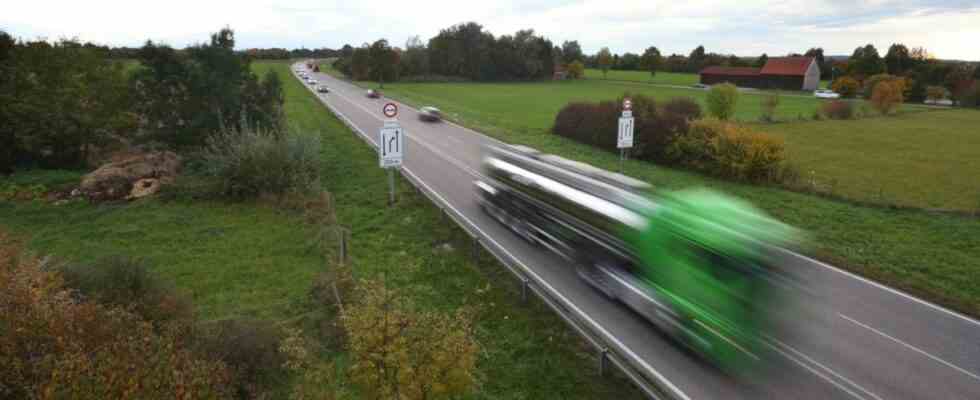The expansion of the B 12 between Kempten and Buchloe to resemble a freeway is currently one of the most controversial road construction projects in Bavaria. The Bund Naturschutz (BN) speaks of an “attack on the Allgäu” and has filed a lawsuit. The main reasons given by BN boss Richard Mergner so far have been the immense use of land for the expansion of the route to a width of almost 50 meters and the costs of at least half a billion euros.
Now the BN has additional ammunition against the project. According to an expert report, the climate balance for the new B 12 and three similar projects in Bavaria is significantly worse than previously assumed. “The CO₂ emissions in and through road construction are systematically calculated,” says Mergner. His demand: “The state government must stop all projects and first determine their actual climate balance.”
Since 2017, the greenhouse gas emissions caused by the projects must also be taken into account when planning federal and other trunk roads. And not just those of the cars and trucks that will one day drive them. But also the CO₂ footprint of the concrete, asphalt and other materials used in their construction. And of course the emissions caused by the intervention in bogs, forests, farmland and the like.
These so-called life-cycle emissions are systematically underestimated by the federal and state governments. That says the traffic researcher Ralf Hoppe. On behalf of the BN, he checked the plausibility of the life cycle emissions that the federal and state governments state for the new B 12 and the three similar projects. Hoppe’s result: the calculations are all full of errors.
Richard Mergner from the Bund Naturschutz calls for a moratorium on road construction in Bavaria.
(Photo: Alessandra Schellnegger)
Take traffic-related emissions as an example: “Although the federal government is forecasting an increase in the number of cars and trucks in the projects, at least in part, it expects them to reduce CO₂ emissions,” says Hoppe. From his point of view, neither the calculations themselves nor the traffic models on which they are based are plausible. Example of construction-related emissions: The federal and state governments work with generalized approaches, but the actual planning is usually more complex than the estimates. In one of the projects examined, the new B 26 near Würzburg, the construction-related emissions from the planned bridges and a three-lane construction section were even missing. Hoppe’s conclusion for the emissions caused by interventions in the landscape is even more dramatic: “So far, they have not been taken into account at all.”
But that’s not all. According to Hoppe, the monetary assessment of the climate costs, to which the federal and state governments are also obliged, is systematically too low. The planners consistently calculated with an outdated amount of 145 euros per tonne of released CO₂. However, according to current case law, the actual costs would be 700 euros per tonne, i.e. higher by a factor of five. One more reason for Mergner to call for the moratorium.
Minister speaks of a “culture war against the car”
Bavaria’s Minister of Construction and Transport, Christian Bernreiter (CSU), strictly opposes a freeze on construction. The federal government must assess whether the CO₂ calculation for federal and other trunk roads is correct, as it is responsible for this. “But putting all Bavarian road construction projects on hold is out of the question,” he says. Bernreiter calls the demand “another attempt to advance the culture war against the car”. Especially in rural areas “not everyone could go to work by bike or train”. In addition, “buses, shared taxis and electric cars also need roads”.
Traffic is the number one climate sinner in Bavaria. According to the Bavarian Energy Atlas, its share of the total CO₂ emissions in Bavaria is 36 percent. According to the Federal Climate Protection Act, traffic-related emissions in Germany and thus also in Bavaria must be reduced by 48 percent by 2030.

